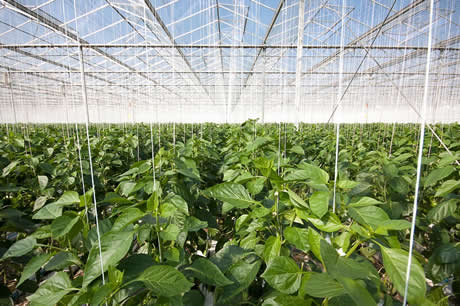
Bio twine is the twine of the future
Although Lankhorst Yarns also produces plastic twine, Lankhorst sees the Elite Bio Twine as the “twine of the future. “We also see a continual growth, but will certainly have to continue to stimulate this. If there is no financial advantage for a grower, he won’t pay more for it,” says Joris van Calcar of Lankhorst Yarns.
Lankhorst Yarns has been supplying the compostable horticultural twine Elite Bio Twine, made from the organic raw material PLA, a lactic acid and in this case, plant sugars, since 2009. The company started the development of the compostable twine in 2005 after the company had done previous research in 1993 and 1998. “What is unique about this product besides being compostable is the manner of production,” says Joris. “The twine is made in the same way as ‘normal’ polypropylene twine.”
Compostable
The Elite Bio Twine, dependent on the circumstances, breaks down in industrial compost in 5 to 8 weeks into an unrecognisable, hummus like substance. If there are remains of string left in the soil after the compost phase, these will break down without leaving behind toxins. At the moment there is global scientific research into supporting this with facts.
Growth of Elite Bio Twine
Elite Bio Twine is distributed globally. Since its introduction the sales of organic twine have risen, but it hasn’t taken real flight, especially in the Dutch horticulture. If there is no financial advantage for a grower, they won’t pay more for it. However, there are various tests this year in large greenhouses in the Netherlands that should provide good results.
For now the competition mainly comes from the traditional natural fibres. “Viscous cotton, or viscous jute and sometimes pure jute or sisal. But there are downsides to these products. To really get a boost there will have to be a financial motivation besides the green thinking. The government could play an important role if they focus their policy on sustainable cultivation and waste processing.”
Waste processing costs
An extra stimulation could be if waste processing costs go up due to the plastics in the waste. “This would mean the higher price for our PLA twine would be made back in the process. The grower will still have to get used to the manner of calculation, as they generally just look at the purchasing price, not what it provides in the end. Even the string that holds up the entire capital of the growers is only viewed in terms of the purchasing price. We already have enough evidence that composting costs money and the costs for the waste with PLA is lower than the polluted waste with PP twine.”
Another reason to use PLA twine is the demand from retailers for the use of an organic material to make the chain more sustainable. “Large retail chains are already working with a points system based on sustainability among the growers. In Australia waste with plastic in it has to be carried over such a long distance that the costs are too high. With it comes a strong development in the area of composting and selling compost. In the Netherlands there is no sign of this. Compost companies also still have insufficient policy for this, apart from with plastic cups.”

Although Lankhorst Yarns also produces plastic twine, Lankhorst sees Elite® Bio Twine as the twine of the future. “Plastic twine can never be fully separated from your green waste. The plastic you can get out is contaminated with green materials. And there are often still remains of plastic twine in the compost. Maybe just a few percent, but if plastic is being put in the ground year on year the total percentage will increase.”
Bulb cultivation and agriculture are more frequently reporting finds of plastic. Lankhorst Yarns will continue to further develop Elite Bio Twine, PLA compostable twine and continue to invest in the further development of the twine of the future. “Investing in a product that makes the world better and cleaner is a conviction for Lankhorst.”
The company will be at the HortiContact in Gorinchem to promote the Elite® Bio Twine and to support the dealers. They can also be found at the GreenTech in Amsterdam.
For more information:
www.ELITE-HORTI.com
